Menu
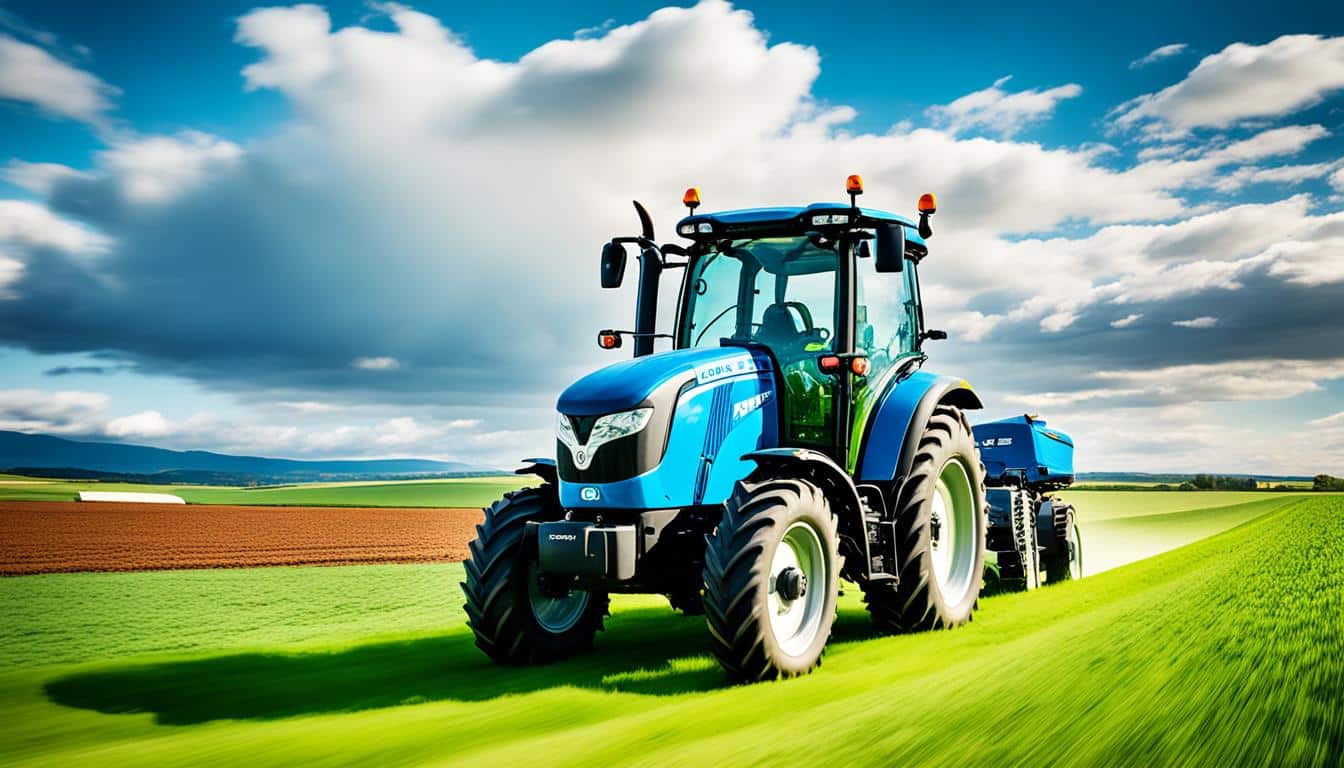
Did you know that one electric tractor can cut emissions equal to those of 14 cars? With the demand for sustainable farming on the rise, electric tractors are meeting the challenge. They cut our use of fossil fuels and improve efficiency with the latest tech. In the San Francisco Bay Area, Monarch Tractor is leading the way. Their autonomous e-tractor is emission-free and its battery lasts about 25 years.
The first model from Solectrac in Sonoma County hit the market in 2017. It has since gained popularity thanks to state aid and more available models. These electric tractors can run for up to 14 hours without recharging. The Mark-V from Monarch even offers extra battery carts for longer work times. This shows how sustainable farming equipment has entered a new phase.
Electric tractors are changing the game in farming. They offer smart, eco-friendly ways to farm. By cutting down on harmful emissions, they’re making the move towards a green future. Along with their high efficiency, these vehicles shape the future of agriculture.
Electric tractors mark a big shift in farming. Their market is set to jump from $0.7 billion in 2024 to $3.4 billion by 2030. Tractors from Monarch save users over $198,000 on fuel in the first year. They also give detailed real-time data to improve farming’s cost-effectiveness and management.
Choosing between electric and diesel tractors goes beyond just air pollution. Electric ones are simpler, needing less upkeep. This leads to lower maintenance costs and less wear. Plus, you can get financial help from both state and federal EV programs, like those in California.
| Aspect | Electric Tractors | Diesel Tractors |
|---|---|---|
| Operational Savings | $198,000 in the first year | High fuel expenses |
| Maintenance Costs | Lower due to fewer moving parts | Higher due to complex engines |
| Incentives | State and federal rebates | Limited |
| Emissions | Zero emissions | High emissions |
| Noise Levels | Reduced | High |
Switching to electric tractors is wise for saving money long-term. With stricter emissions rules, they’re more of a future-proof choice. Innovations in vehicles like Monarch’s MK-V keep getting better with updates. And, in places like California, big savings through rebates put electric tractors at an equal or better price than diesel, boosting their use in agriculture.
Electric tractors are the future of green farming. They bring many advantages over diesel ones. These help the environment and make farming more efficient and healthy.
Electric tractors don’t emit any harmful gases. This is great for the planet. By using electric tractors, farmers cut down on pollution. For example, using a Monarch Tractor’s MK-V instead of a diesel one reduces pollution by as much as removing 14 cars from the road. This help in sustainable farming and fighting climate change.

Electric tractors are much quieter than diesel ones. This makes the farm a more peaceful place to work. With less noise, farmers are under less stress. It also means better relations with neighbours.
| Aspect | Electric Tractors | Diesel Tractors |
|---|---|---|
| Emissions | Zero emissions | High emissions |
| Carbon Footprint | Reduced carbon footprint | Significantly higher carbon footprint |
| Noise Levels | Low | High |
| Operational Expenses | Lower | Higher due to fuel and maintenance |
Electric tractors, like the Monarch MK-V, save a lot of fuel. Monarch Tractor says their customers saved $198,000 in fuel in the first year alone. They also cost less to maintain. This is because they have fewer parts that wear out.
The market for electric tractors is growing fast. It could go up from $0.7 billion in 2024 to $3.4 billion by 2030. This growth shows that more and more farmers find electric tractors a smart and green choice.
Advancements in electric tractor tech, like those from Monarch, are changing farming. They move us from diesel to electric. But they also bring new, easy-to-use autonomous features. These boost efficiency too.
Modern electric tractors can work on their own. Monarch’s smart, electric tractors don’t always need a driver. In tests, their MK-V model saved money and worked better. Autonomous electric tractors in vineyards saved around $2,600 on fuel yearly. Plus, they cut over 34,000 lbs. of CO2e.
In a dairy farm trial, these features upped milk by making feeding automated. This meant less work for farmers. Also, using tractors autonomously in apple orchards saved up to $12,000 in labour costs each year.
New tech like special wheel motors and suspensions are changing electric tractors. They fix problems like wheel slips and how loads are spread. Monarch Tractor even uses 360-degree cameras for careful driving and attaching tools. This makes the tractors safer and more efficient on all grounds.
Most electric tractors can run for eight hours or more. Monarch’s MK-V can go for up to 14 hours on one charge. It takes about six hours to fill the battery from empty. This makes using electric tractors on farms a practical, long-lasting choice.
| Aspect | Traditional Diesel Tractors | Electric-Powered Tractors |
|---|---|---|
| Fuel Costs | High | Low (especially with solar) |
| Emissions | High Carbon Emissions | Zero Emissions |
| Maintenance | Complex and Costly | Simple and Cost-effective |
| Noise Levels | High | Significantly Low |
| Operational Efficiency | Manual Operation Required | Autonomous Capabilities |
| Run Time | Limited by Fuel Use | Up to 14 Hours Per Charge |
The electric farm machinery field is advancing fast with top brands leading. Monarch Tractor and Fendt are two key players. They shine in making farming smart, efficient, and eco-friendly.
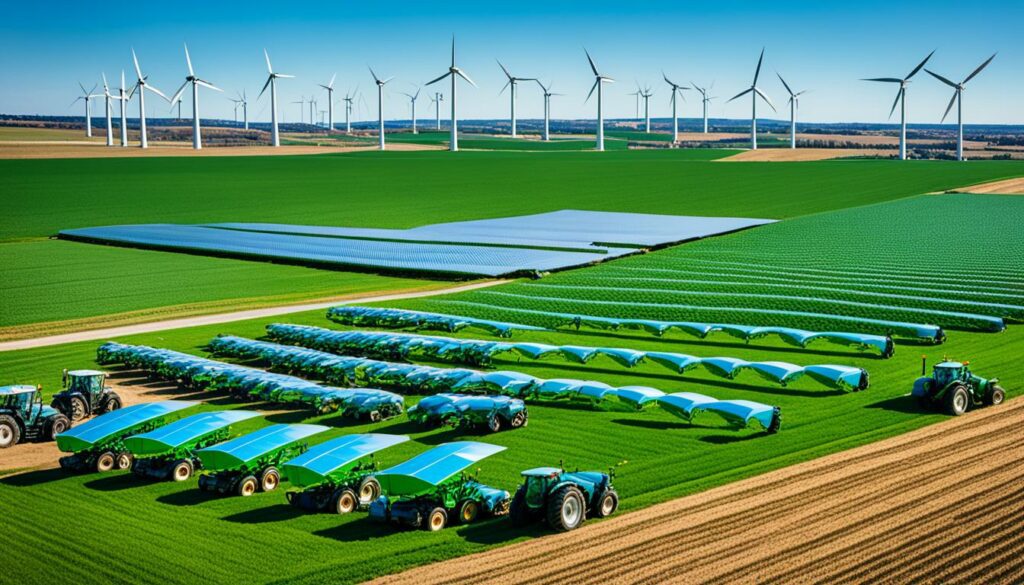
A US company, Monarch Tractor, changed farming with electric, self-driving tractors. The Monarch MK-V is special. Its clever tech means it saves farmers money and the environment by cutting CO2 emissions.
Monarch Tractor also arm farmers with live data through its Wingspan Ag Intelligence (WingspanAI) system. This boosts farm management. Plus, it can work for 14 hours and then quickly recharge in only six hours. This makes it a great help for all kinds of farm work.
In Germany, Fendt is turning heads with its Fendt e100 V Vario. This tractor is great for any farm, even delicate places like vineyards. It’s famous for being flexible and hard-working.
AGCO, Fendt’s parent company, packed the e100 V Vario with special features. This allows it to handle different farm jobs smoothly. Its small size helps it move well in tight spaces. And it’s designed to be eco-friendly, reducing agriculture’s impact on the planet.
Overall, Monarch Tractor and Fendt are leaders in the electric farming world. They mix innovation and green thinking to match today’s farming needs.
The move to electric tractors and farming tools has speeded up thanks to government help. In Minnesota, farmers can get up to $2,500 off new electric cars and $600 off used ones through the state’s Commerce Department. These savings help farmers get over the high prices of electric tractors.
The state’s Pollution Control Agency also backs this change, offering up to $375,000 for each project. This money aims to help switch diesel buses for electric ones. The big grants show how serious Minnesota is about green farming gear.
There’s also a cool deal for electric vehicles called the EV Toll Credit Pilot Program. It gives $125 for plug-in cars and $250 for full electric cars. This scheme is not just for tractors but for all green cars, making farm machines more eco-friendly.
| Incentive Program | Details |
|---|---|
| EV Rebates (Minnesota Department of Commerce) | Up to $2,500 for new vehicles, Up to $600 for pre-owned vehicles |
| Electric School Bus and Infrastructure Grants | Cover up to 95% of vehicle and infrastructure costs |
| EV Toll Credit Pilot Program | $125 for plug-in hybrids, $250 for all-electric vehicles |
| Electric School Bus Grants (MPCA) | Up to $375,000 per project |
| Off-Road Diesel Replacement Grants (MPCA) | Funding for replacing off-road diesel equipment |
The Biofuel Grant and Idle Tech Loan programs also offer a financial boost. Minnesota’s Agriculture Department gives grants for biofuel up to $2.1053 per MMbtu. Plus, there are low-interest loans for up to $75,000 on green projects. These add to the funds available for switching to electric farm gear.
All these government schemes are helping cut down the upfront costs of electric farming tools. More incentives will likely push more farmers to go green, improving our farms’ effect on the environment.
Electric tractors play a big role in making farming sustainable. They help keep soil healthy and protect the environment. These tractors are light, so they don’t squash the soil too much. They also don’t leak fuel, making them better for the earth.
Electric tractors are kind to the ground. They are not as heavy as the old diesel ones, which is good for the soil. Because of this, the soil stays healthy and there’s more life in the farms. Solectrac and Farm-ng’s Amiga are good examples of these tractors. They are making a positive change in farm equipment by making it eco-friendly.
Using electric tractors means using less fossil fuels. This is key to cutting down the pollution from farming. For example, farmer Domenick Buck bought 18 electric tractors. He is helping the planet by using less petrol. The Monarch Tractor Mark-V shows how powerful electric tractors can be. It can work for 14 hours without needing to refuel.
| Model | Price | Battery Life | Autonomous Capabilities |
|---|---|---|---|
| Monarch Tractor Mark-V | $89,000 | 14 hours | Yes |
| Amiga by Farm-ng | $12,990 | 8 hours | No |
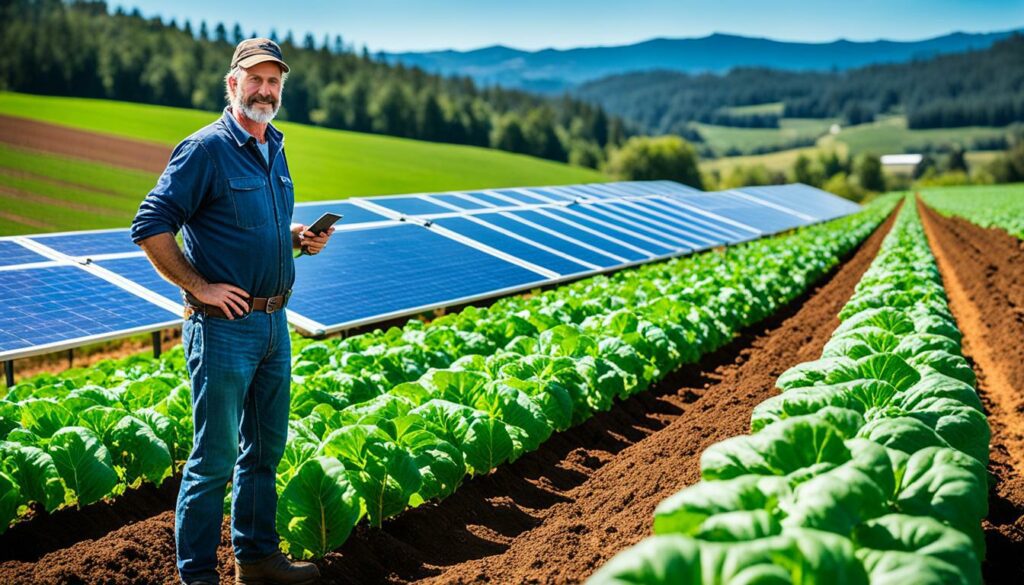
Looking at farmers who have started using electric tractors, we see great changes in farming. These changes are thanks to cool tech like Monarch Tractor and Farm-ng’s Amiga. They show us what farming might look like in the future – a future that’s eco-friendly and efficient.
Coastal Vineyard Care Associates is a great example. They added Monarch Tractor to their vineyards and saw real benefits. They saved a lot on fuel, made things more automated, and became much more efficient. In two years, Monarch Tractor got a lot of attention worldwide, got lots of positive coverage, and got a big boost in funding. Big news places like Reuters and Bloomberg talked about it. This shows Monarch has the power to change how vineyards work.
Farm-ng’s Amiga has also made a big impact, especially at Rancho Soquel. This electric tractor is great for lots of different crops. It does precise jobs well and makes moving stuff around a lot easier. It’s good for the earth, helps farms work better, and is good for the farm’s wallet. The tractor’s life is also much longer, which saves the farmer money in the long run.
All these stories show how electric tractors are shaking up farming. Coastal Vineyard Care and Rancho Soquel are saving money, working better, and helping the planet. It’s the start of a new farming chapter – one that’s all about being green and smart.
Switching to electric tractors is not easy, even though it’s full of promise. The *challenges* start with the initial cost. Buying electric tractors is much more expensive at first. Despite this, saving money in the long term and helping the planet are big bonuses. Farmers have to think about how state benefits and lower running costs might balance out this big starting cost.
Starting with electric is hard for many because of the cost. Electric tractors are pricey, even with help from the government. Diesel tractors, with their powerful engines and lower prices, have been the choice for most. But moving to electric means spending a lot more money.
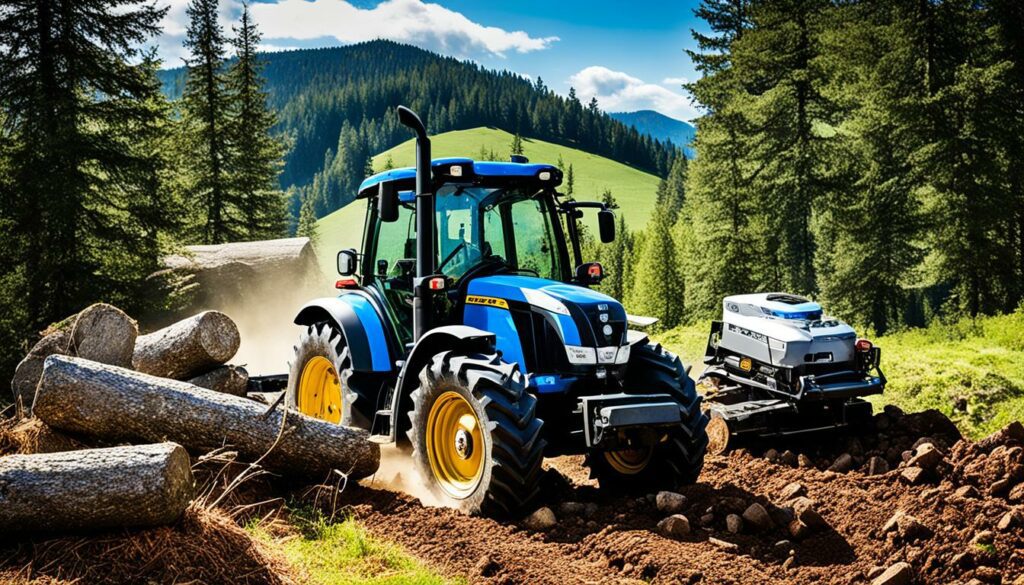
John Deere, Kubota, and Solectrac are changing the game with better prices and payment plans. The electric tractor market is growing fast, possibly reaching up to $100 billion a year. This shows a great chance for businesses to expand and invest in the future.
The life of electric tractor batteries and how far they can travel are critical problems. For example, the Monarch Tractor has a long-lasting battery that can work for up to 25 years. But, daily use matters a lot. Farm-ng’s Amiga can run for about eight hours per charge. This might be enough for some small jobs but not for bigger tasks.
Scientists are working to make batteries hold more energy, aiming to at least match diesel’s power. Also, using Wi-Fi for electric tractors’ smart features faces problems. Good Wi-Fi isn’t always available in rural areas. This makes complete use of the technology tricky.
| Brand | Battery Life | Operational Range |
|---|---|---|
| Monarch Tractor | Up to 25 years | Varies by usage |
| Farm-ng Amiga | 8 hours per charge | Suitable for small-scale tasks |
| Solectrac | Equivalent to 30-40hp diesel tractors | Depends on model and use |
Electric tractors are very useful in different farming places. They have no emissions and work efficiently. This makes them great for greenhouses and indoor farms.
In greenhouses, electric tractors work without polluting. They help plants grow by keeping the air clean. These tractors work well in indoor farms, too. They are good for the environment and save energy.
Electric tractors are also good on mountains or tough farms. The Fendt e100 V Vario, for example, is small and tough. It moves well in narrow spaces in orchards or vineyards. These tractors turn power into action quickly in difficult areas. They’re quiet at night, making farms safer.
| Advantages | Greenhouses and Indoor Farming | Mountainous and Challenging Terrains |
|---|---|---|
| Emissions | Zero emissions ensuring clean air | Zero emissions, reducing pollutants in sensitive environments |
| Operational Efficiency | Flexible power output for energy efficiency | Instant torque for handling quick adjustments |
| Noise Levels | Low noise, benefiting plant growth and worker health | Low noise, aiding communication and night operations |
Electric tractors are changing how farms work, especially in California. Monarch Tractor introduced their first self-driving electric tractor in 2018. This move not only helps with less available workers but also makes farm work less physically tough.
At Coastal Vineyard Care Associates in Santa Barbara, 18 electric tractors joined their fleet. They have 40 diesel engines. This change cuts down on the hard, manual work needed on farms. It also makes farming more efficient thanks to the help of advanced technology.

Companies like Monarch and Farm-ng are trying to fix the problem of not enough farm workers. They know that more than half of farmers are struggling to find enough people to work. These electric machines are a big help because they reduce the number of workers needed.
But, the shift to these advanced tools raises worries about job safety. For example, one strawberry-picking robot could do the work of 30 people in just three days. It’s important to think about how these changes affect jobs. Figuring this out helps ensure that everyone benefits from these new tools fairly.
Each Monarch Tractor starts at $89,000, and the Farm-ng Amiga costs $12,990. Luckily, there are rebates in California that can bring these prices down. Plus, these tractors can work up to 14 hours on one charge that takes only 5.5 hours. This means they are a good investment for farmers.
In short, electric tractors are making farms more productive and efficient. They do, however, change the kinds of work that people do on farms. Making sure these changes are good for everyone is important.
Maintaining electric tractors well is crucial. Their long-lasting batteries and economical use make them great for farmers to use over a long time. Also, as battery tech gets better, these machines work more efficiently and are more reliable.
A tractor’s battery life is key to how long it lasts. The batteries can work for 8 to 15 years or more, depending on how they’re used and the environment. Models like the Monarch Tractor MK-V can find and fix problems fast, often without leaving the field. This helps these tractors keep working well and for a long time.
Electric tractors are cheaper to maintain than diesel ones. They have fewer moving parts, so they don’t wear out as quickly. This means that maintaining them costs a lot less. Unlike traditional tractors, electric tractors don’t need 10% to 15% of their total running costs spent on maintenance and repairs every year.
Not spending as much on maintenance saves a lot of money in the long run. Also, these tractors can get updates through the air. This helps avoid long periods when the tractor is out of action.
| Aspect | Electric Tractors | Diesel Tractors |
|---|---|---|
| Maintenance Frequency | Infrequent | Frequent |
| Average Annual Cost | Lower | Higher |
| Downtime | Minimal | Significant |
The future for electric tractors looks very promising. Market experts expect big growth in the next few years. From 2024 to 2030, they predict the market will grow from USD 0.7 billion to USD 3.4 billion.
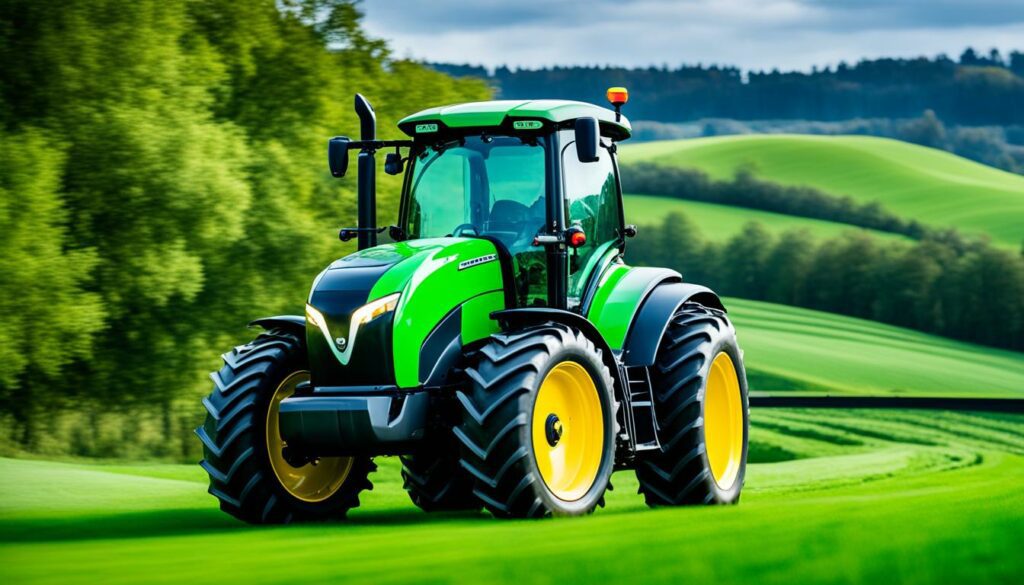
Monarch Tractor stands out in this field. They already boast big savings for their customers. In the first year, they helped save over $198,000 in fuel costs. Their MK-V model is a top example of the latest electric tractor technology.
It’s a smart tractor that doesn’t even need a driver to work. It also collects important data and can report it. Innovations like this make paying for renewable energy systems worth it much faster.
Electric tractors are also much easier to look after. They have fewer parts than traditional diesel machines. This means they cost less to maintain. They can quickly start and stop when needed. This makes them perfect for tasks that require fast reactions.
Getting financial help from the government is key to making this change. Government tax breaks and other support schemes help farmers buy electric tractors. This not only saves money on fuel but also helps make farming more sustainable.
Monarch’s WingspanAI tool is a great help for farmers. It can help them use their resources better. It also cuts costs. Plus, electric tractors are quieter, which makes working at night safer and more pleasant for farm workers.
You can charge these tractors with clean energy. This helps make farms more self-sufficient when it comes to energy. Monarch Tractor is leading the way by producing a large number of these eco-friendly tractors.
Future electric tractors will keep getting better. They will stay charged longer and work in more places. These changes are not just making farming better, they’re making it greener and more profitable for the long term.
| Aspect | Current State | Future Expectations |
|---|---|---|
| Market Growth | USD 0.7 billion (2024) | USD 3.4 billion (2030) |
| Fuel Savings | $198,000 in the first year (Monarch Tractor) | Increased savings with wider adoption |
| Maintenance Costs | Significantly lower than diesel tractors | Continued reduction with technological advancements |
| Battery Life and Charging | Up to 14 hours runtime, 6 hours to charge (Monarch MK-V) | Further enhancements in battery efficiency and longevity |
| Incentives | Present (Federal and State Support) | Possibility of increased financial and regulatory support |
Electric tractors cut down on harmful greenhouse gases. But that’s not all they do. They also make farms quieter and help save our planet’s resources. This is good news for a cleaner, quieter, and more sustainable farming future.
Electric tractors are a big help in the fight against noise pollution. They’re not as loud as the old diesel ones. This means a more peaceful farm for the workers. It’s also good for the animals and people living nearby.
These tractors are eco-friendly in another way. They don’t need oil-based fuel, so there’s less chance of harmful leaks. And they’re kinder to the soil thanks to less soil compression. This helps the land stay healthy for growing things. So, by using electric tractors, we can farm in ways that don’t harm the environment. They save natural resources today for a better tomorrow.
Electric tractors are leading a green farming revolution. They are a cleaner, quieter, and better alternative to diesel tractors. The market for these eco-friendly tractors is growing at 11.1% every year. By 2026, their sales are expected to hit $218.9 million worldwide, showing a big change in farming.
They promise to reduce farming’s impact on the planet. These tractors work for 4-6 hours on one charge. This means they can help cut down on harmful emissions a lot because they don’t need much fuel. They are also quieter, which is good for people living near farms or students at schools close by.
But there are still some challenges to overcome. The price of these tractors might be too high for some farmers. Also, not all places have enough places to charge them. Yet, charging overnight when electricity is cheaper helps save money. And, as batteries get better and the government gives more support, more farmers will likely switch to electric tractors.
Models like John Deere’s GridCON, Sonalika’s Tiger, and the Escort Farmtrac (26E) show what’s possible in farming. These tractors offer more power and work more efficiently than traditional ones. Choosing electric tractors is a key step towards a more sustainable farming future.
Electric tractors offer many advantages. They have zero emissions and a smaller carbon footprint. They are also quieter and healthier for farmers. Plus, they help keep the soil in good shape by reducing compaction and the risk of fuel spills.
Compared to diesel tractors, electric tractors like Monarch Tractor are more efficient. That means they cost less to run, need less maintenance, and last longer, up to 25 years. They also make farming operations more scalable and potentially improve how labour and fields are managed.
Today, electric tractors have groundbreaking technologies. They can drive by themselves, have motors in their wheels, and use advanced suspension systems. These innovations boost the tractors’ efficiency, cut down on energy use, and let them handle difficult ground better.
Top marks in the electric tractor market go to Monarch Tractor and Fendt. Monarch Tractor stands out with its Mark-V, which can drive itself and has advanced automation. Fendt’s e100 V Vario is known for being versatile and efficient in many farming settings.
Yes, incentives and rebates help make electric tractors more affordable. This cuts the buying cost down to being similar to or lower than diesel tractors. Plus, it’s good for the environment.
Electric tractors are key for sustainable farming. They cut down on fossil fuels, help wildlife thrive, and keep the soil healthy. Since they don’t spew out emissions, they also help reduce the carbon imprint.
Monarch Tractors at Coastal Vineyard Care Associates reduced fuel use and brought automation to the vineyards. At Rancho Soquel, Farm-ng’s Amiga tractor handles precise tasks and makes farm work easier. This includes a variety of crops.
There are hurdles to going electric, like the high cost upfront, how far they can go between charges, and how long the battery lasts. Even with help from incentives, buying one is a big investment. Prospective buyers have to think about their needs and the tractor’s abilities.
Electric tractors, like the Fendt e100 V Vario, are great for all kinds of farms, even in greenhouses. They don’t make any emissions and have power that adjusts to what’s needed. They’re also good on rough terrain.
Electric tractors with smart features can make up for fewer farm workers and make the job easier. But, there are worries about what happens to jobs when this tech comes in.
Electric tractors should last a long time and not require much to keep running. They don’t have the complex parts that need a lot of care. Plus, they often get updates and support remotely, helping them work without problems for a long time.
The future is bright for electric tractors. They’ll get even better, lasting longer on a charge, being more automatic, and fitting in with more farming situations. Manufacturers are focusing on making them meet the needs of sustainable farming.
Electric tractors make farms quieter and save the environment in many ways. By not using fuel, they help save the planet’s resources. They also beat up the soil less, so farmland stays good for farming now and in the future.